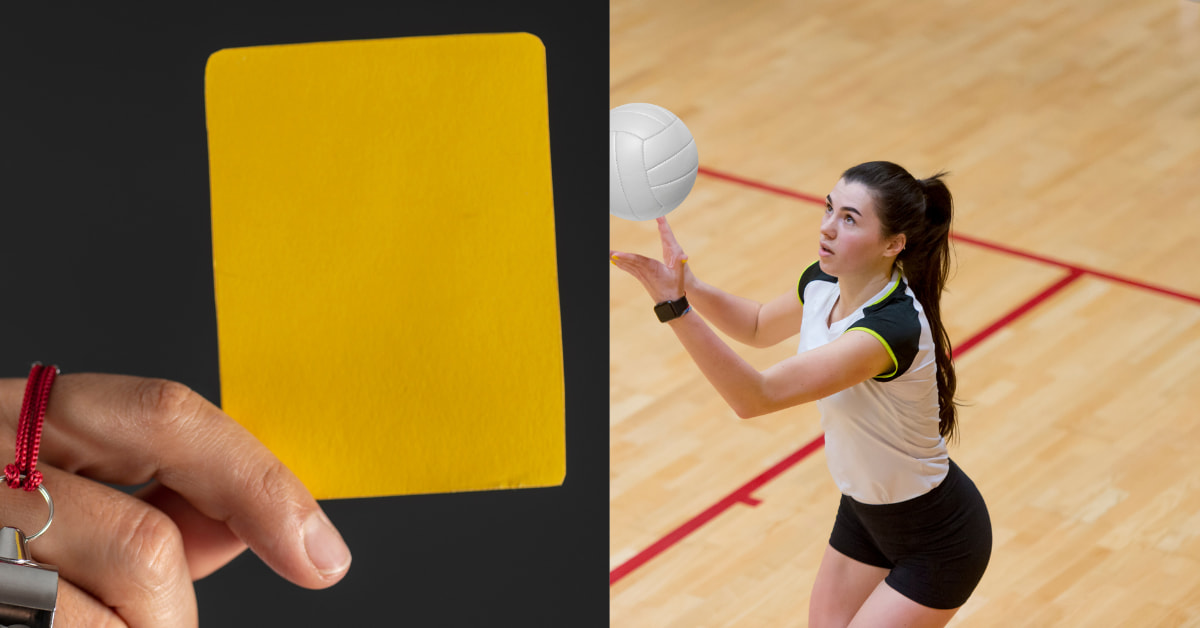What’s a Yellow Card in Volleyball?
In the exciting game of volleyball, referees use various methods to maintain fair play and discipline among players and coaches. One such method is the issuance of cards, similar to those seen in other sports.
In volleyball, a yellow card is a significant tool used by referees to caution players and coaches regarding their behavior.
Let’s delve into the details of what a yellow card signifies and its implications in the game.
Yellow Card in Volleyball
A yellow card in volleyball serves as a warning or a cautionary measure to players or coaches for their conduct.
When a referee deems a player or a coach’s behavior to be inappropriate or against the rules, they may issue a yellow card.
It acts as a formal notification that the person’s actions are unacceptable and should be corrected immediately.
Why Would Yellow Cards Be Given Out in Volleyball?
Yellow cards are given out in volleyball to address offensive behavior, rude conduct, and aggressive behavior, all of which violate the rules or code of conduct and undermine the spirit of fair play.
Offensive Behavior
One of the primary reasons for issuing a yellow card in volleyball is offensive behavior. This includes actions such as disrespectful or insulting language, gestures, or actions towards opponents, referees, or even teammates.
Volleyball promotes fair play and sportsmanship, and any behavior that goes against these principles may result in a yellow card.
Rude Conduct
Rudeness towards opponents, referees, or spectators is another cause for a yellow card. This includes showing disrespect through verbal or non-verbal means, such as excessive arguing, shouting, or making derogatory remarks.
Volleyball encourages mutual respect, and any behavior that undermines this can lead to disciplinary action.
Aggressive Behavior
Aggression that exceeds the acceptable limits of the game can also warrant a yellow card.
This includes physical altercations, deliberately targeting opponents with excessive force or any action that endangers the safety of others on the court.
Volleyball prioritizes the safety of its participants, and any behavior that compromises this will be addressed with a yellow card.
How Many Yellow Cards Do You Get in Volleyball?
In volleyball, the number of yellow cards a player or coach can receive depends on the competition’s rules and regulations. Generally, accumulating two yellow cards in a single match leads to a red card, which results in immediate expulsion from the game.
What Happens When a Coach Gets a Yellow Card?
When a coach receives a yellow card, it serves as a formal warning regarding their behavior. Depending on the competition’s rules, multiple yellow cards can result in disciplinary consequences for the coach, such as expulsion from the game or a suspension for future matches.
Frequently Asked Questions
How Many Yellow Cards Do You Get in Volleyball?
The number of yellow cards allowed in volleyball varies based on the competition’s rules. However, accumulating multiple yellow cards within a match often leads to a red card and subsequent expulsion.
What Does a Green Card Mean in Volleyball?
In some volleyball competitions, a green card may be used to indicate a warning for minor rule infractions. It serves as a milder caution compared to a yellow card.
What Is a Purple Card in Volleyball?
There is no official purple card in volleyball. The yellow and red cards are the most commonly used disciplinary tools in the sport.
Is There a Black Card in Volleyball?
No, there is no black card in volleyball. The yellow and red cards serve as the primary means of issuing cautions and expulsions.
Conclusion
In the game of volleyball, a yellow card plays a crucial role in maintaining fair play, sportsmanship, and discipline. It serves as a warning to players and coaches, indicating that their behavior requires immediate correction.
Whether it’s offensive conduct, rudeness, or aggressive behavior, a yellow card alerts individuals to the need for improvement. By upholding the principles of fair play and respectful behavior, volleyball can continue to be a thrilling and enjoyable sport for all involved.









2 Comments
Comments are closed.